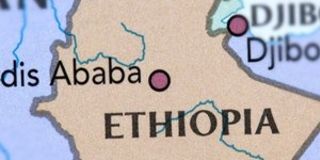Ethiopia and Eritrea: decades of dispute over a border

What you need to know:
Here is an overview of their troubled relationship.
Addis Ababa, Ethiopia. Ethiopia and Eritrea have been bitter enemies for decades, fighting a frontier war in 1998-2000 that cost nearly 80,000 lives, but a breakthrough was signalled Sunday when they agreed to reopen embassies and borders.
Here is an overview of their troubled relationship.
- Eritrea breaks away -
In 1962 Ethiopia's last emperor, Haile Selassie, proclaims the annexation of Eritrea, abolishing its autonomous status and effectively making it a province.
Eritrea launches a war for independence that lasts nearly 30 years.
In 1991 Eritrean rebels, who help overthrow the military-Marxist Ethiopian regime of Colonel Mengistu Haile Mariam, seize the Eritrean capital Asmara. They install a government, gaining de facto independence.
Eritrea gains full independence in May 1993, a secession blessed by Addis Ababa.
However the 1,000-kilometre (620-mile) border between the neighbours is not properly defined.
- War breaks out -
In May 1998 skirmishes erupt after Eritrean forces enter the area around Badme, claiming the town under borders drawn during Italian colonial rule.
Fighting spreads and in June the warring sides carry out air strikes.
The ensuing conflict is marked by trench warfare and large-scale pitched battles, alternating with long periods of calm. Attempts at mediation fail.
Fighting flares anew in May 2000. A fierce bombardment of Eritrea turns the conflict in favour of Ethiopia, while indirect negotiations resume in Algiers.
- Peace deal reached -
In June 2000 they reach an initial peace accord brokered by the Organisation of African Unity (OAU).
It allows for the deployment of a UN peacekeeping force in a border buffer zone and calls for the withdrawal of Ethiopian troops from areas inside Eritrea.
An official peace pact signed in December 2000 establishes a Boundary Commission, which sits at the International Court of Arbitration in The Hague, to officially demarcate the disputed frontier. Its ruling is to be "final and binding".
- Border ruling rejected -
In April 2002 the commission attributes to Eritrea chunks of land along the border, including the contested town of Badme.
Ethiopia rejects the ruling as "illegal, unjust and irresponsible" and requests an "interpretation, correction and consultation". The commission refuses.
Ethiopian forces continue to occupy the town. The standoff delays the physical demarcation of the border in terms of the commission's ruling.
Tensions rise between the two sides with gunfire, landmines and troop movements near the border.
- Stalemate -
In May 2006, amid fears of a new all-out war, talks are held in London on resuming the demarcation of the border but fail, the neighbours accusing each other of holding to inflexible positions.
In June Ethiopia claims to have killed more than 110 rebels allegedly sent by Eritrea to destabilise the country, a claim denied by Eritrea.
Meanwhile fears arise that the feuding neighbours may be using Somalia as a proxy battleground.
As the dispute drags on, border regions experience regular attacks and incidents.
- Concession, breakthrough -
In June 2018 Ethiopia's new prime minister, Abiy Ahmed, announces his country will abide by the 2002 ruling requiring it to cede territory, including Badme, and withdraw its forces.
Eritrea's President Isaias Afwerki responds positively and sends a delegation to Addis Ababa to plan for future action.
Talks are announced between the rival leaders and Abiy arrives in Asmara on July 8 for the meeting, cheering crowds lining the streets to welcome him.
At dinner afterwards Abiy announces that the two countries will reopen embassies and borders between them, a major step in normalising ties.




